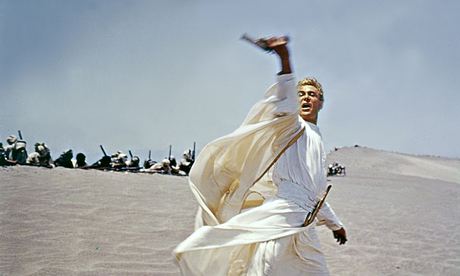
A certain type of Englishman reveres Arab culture and Islamic finery. Wilfred Thesiger, the explorer, loved to wear the gorgeous flowing robes of the Marsh Arabs; Rory Stewart, the Arabist and Tory MP, has travelled manfully through the Punjab wearing a Pakistani shalwar kameez suit and turban. (One can almost see it on the catwalk.) John Simpson of the BBC, not least, slipped into a woman's burqa in 2001 prior to the US assault on Kabul. For these English thrusters, Islamic dress offers a Boy's Own thrill of disguise.
Thomas Edward Lawrence, "Lawrence of Arabia", was another who looked the part in Bedouin camel wool and Arabia-style headcloths. He stirred up Arab revolt against the Ottomans during the first world war and helped to create the Middle East as we know it today. The story of how the painfully shy Oxford archaeologist became a crusader figure for the Arab revolt has been told many times. Scott Anderson, an American journalist, has written the most scholarly life of Lawrence to date.
Like many Arabists, "Lawrence of Arabia" shared the sublime Victorian presumption that a harsh nomadic life makes a better person. He praised the asceticism of the sand-dwelling Bedu and rejected the feather bed of western civilisation. In the rugged male culture and "purity" of the Arabian desert, moreover, he may have found homoerotic interest. His Arabian memoir Seven Pillars of Wisdom, published in 1922, exalts "beautiful, soft-framed, girlish" Arab boys.
Throughout, Anderson gives a clear account of the theatre of operations in the Middle East from 1916 to 1918, when Lawrence was active there. The regions known today as Iraq, Syria, Israel, Saudi Arabia, Yemen and Egypt were then under the control of the Ottoman Empire with its capital at Constantinople (now Istanbul). On paper at least, the British Empire governed Egypt and the Gulf states, as well as the port of Aden. The impending dissolution of the Ottoman sultanate left swathes of the Arabian peninsula up for grabs.
David Lean's 1962 epic Lawrence of Arabia is not much admired by Anderson, who sees the film as essentially hyperbole. Peter O'Toole certainly resembled Lawrence with his hypnotic blue eyes and willowy physique ("If you'd been any prettier, it would have been Florence of Arabia", Noël Coward told him), but the drama of the British-Arab offensive is often overplayed by Lean, Anderson says. The Ottoman defeat at Aqaba on the Red Sea in July 1917, for example, was not the electrifying clash of arms depicted in the movie, but "somewhat anticlimactic".
Lawrence was not the only European attempting to influence Arab fortunes at this time. On the Turco–German side, spies and diplomat-schemers planned to "stoke the fires" of an Islamic jihad against the British. Deftly, Anderson teases out the many strands of anti-Ottoman dissent. Ultimately, the fight for Arab freedom resulted in a Middle East that was largely the invention of the British. Lawrence befriended the young Sheikh Faisal, and helped to put him on the throne of post-Ottoman Iraq.
Headquartered in Cairo, the British envisaged the Arab lands divided among themselves, the French, and a semi-independent Arab state, with a Jewish Zionist domain in Palestine. Lawrence wanted to safeguard Arab nationalism in the Holy Land, yet he was an advocate of Jewish statehood. A Jewish presence among the dunes and palm trees would provide the necessary modernity or "leaven", as Lawrence put it, that would enable the Arabs to move forwards into the 20th century. (It is not always entirely clear what Lawrence thought of the Arabs.) In well researched pages, Anderson portrays Zionism as an essentially secular movement, which championed Jews as not merely a religious group but a nation waiting to be born. It was only unfortunate that, in the move to establish a Jewish state, Arab interests were often secondary.
On his return to England in 1929, Lawrence was in a state of nervous exhaustion. The desert campaigns had left him spent and depleted. Six years later in Dorset, at the age of 46, he was fatally injured in a motorcycle crash. This weighty if readable biography gives the Arab revolt and its dashing architect their due in history.

